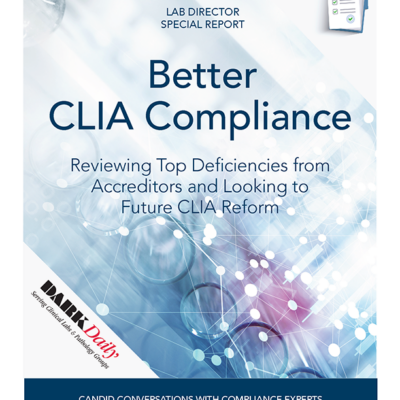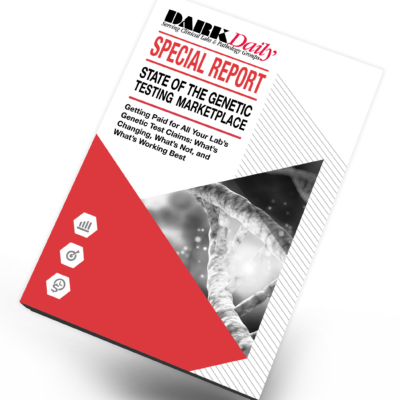European Researchers Discover Gut Bacteria That Can Help Create Universal O-Type Blood
Should further study validate these findings, clinical laboratories managing hospital blood banks would be among the first to benefit from an abundance of universal donor blood In a surprising outcome for microbiome research, scientists at the Technical University of...
Iranian Study Shows Staggering Carcinogenic Risk in Hospital Laboratories from Occupational Exposure to Deadly Chemicals
Study found highest incidences of occupational carcinogenesis among clinical laboratory and histology technicians, followed by pathologists It has been known for years that formalin (a form of formaldehyde used as a disinfectant and preservative in the handling of...
University of Missouri-Kansas City Study Finds Colorectal Cancer Cases Up 500% among Children
Trend will likely lead to physicians ordering more clinical laboratory screening tests for cancer among all age groups, including young patients Upticks in colorectal cancer cases among younger populations, as reported in recent news stores, is an issue that has...
Mass General Brigham Joins with Best Buy Health to Create Country’s Largest Hospital-at-Home Program
Clinical laboratories with mobile phlebotomy programs are positioned to benefit as demand for at-home blood draws increases Hospital-at-Home (HaH) models of remote healthcare continue to pick up speed. The latest example comes from the 793-bed Mass General Brigham...
Keio University and Broad Institute Researchers Identify 18 Bacterial Strains That Could Help Patients with Gastrointestinal Illnesses
Findings could lead to new therapies and clinical laboratory biomarkers for detecting and defeating antibiotic-resistant bacteria Once again, new research shows that human gut bacteria (microbiota) may be useful in fighting antibiotic-resistant bacterial infections....
Genetic Tests Are Detecting Prevalence of Bird Flu Virus in US Wastewater and Allowing Officials to Track its Spread
Though PCR clinical laboratory testing is widely used, some scientists are concerned its specificity may limit the ability to identify all variants of bird flu in wastewater Wastewater testing of infectious agents appears to be here to stay. At the same time, there...
Washington University Researchers Uses Medical Laboratory Test Results and Big Data to Find Accelerated Aging and Risk of Early Cancer in Young Adults
Study shows that computer analysis of clinical laboratory test results has improved greatly in recent years Studies using “big data” continue to show how combining different types of healthcare information can generate insights not available with smaller datasets. In...
Scathing Report from Former Health Minister Finds England’s NHS Plagued by Long Wait Times, Crumbling Infrastructure
Declining health of UK’s population also affecting performance of the country’s national health service, report notes England’s National Health Service (NHS) is “in serious trouble” due to long waiting times, outdated technology, misallocated resources, and numerous...
National Institutes of Health Study Finds No Reliable Biomarkers Exist for Long COVID
Study is another example of how important clinical laboratory testing is when government officials attack a new public health issue Long COVID—aka SARS-CoV-2 infection’s post-acute sequelae (PASC)—continues to confound researchers seeking one or more clinical...
Broad Institute of MIT and Harvard Studies Use of Polygenic Risk Scores to Evaluate Genetic Risk for 10 Diseases
Though not biomarkers per se, these scores for certain genetic traits may someday be used by clinical laboratories to identify individuals’ risk for specific diseases Can polygenic risk scores (a number that denotes a person’s genetic predisposition for certain...
ECRI Study Finds Errors During Testing Processes Are Responsible for Most Diagnostic Errors
Researchers note that many sources of errors associated with diagnostic testing involve how providers order tests and how specimens are handled ECRI (Emergency Care Research Institute), a non-profit organization that focuses on healthcare quality and patient safety,...
South Korean Study Finds Fecal Microbiota Transplants May Help Patients with Gastrointestinal Cancers That are Resistant to Immunotherapies
Study findings could lead to improved treatments for broad range of cancers and the need for microbiome testing by clinical laboratories to guide clinicians Is it possible that there is a connection between an individual’s gut microbiota and the ability to fight off...
Texas Researchers Find ‘Acid Walls’ That Shield Cancer Tumors from Body’s Immune System Response
Discovery could lead to new treatments for cancer and tumors, but probably not to any new diagnostic assays for clinical laboratories Researchers at the University of Texas Southwestern (UTSW) Medical Center have reported discovery of “acid walls” that appear to...
Lancet Study Finds Urgent Need for Improvement in Clinical Laboratory Prostate Cancer Screening Worldwide
Ongoing increases in the global number of prostate cancer cases expected to motivate test developers to deliver better screening tests to pathologists and clinical lab scientists No less an authority than the peer-reviewed healthcare journal The Lancet is drawing...
10-Minute Blood Test Uses Digital Images and AI to Determine Sepsis Risk for Emergency Room Patients
With FDA clearance already approved, hospital infection control teams and their clinical laboratories may have another diagnostic tool for diagnosing blood infections Controlling sepsis in hospitals continues to be a major concern in nations around the world,...
The Joint Commission Launches Accreditation Program for Telehealth Providers
Program is open to providers that exclusively offer telehealth services, and those providers that offer the telehealth services to other hospitals In another sign that telehealth is now an established presence in the healthcare marketplace, The Joint Commission...
Kaiser Family Foundation Reports on Prior Authorization Denial Rates by Medicare Advantage Plans
Another report finds nearly half of all healthcare systems planning to opt out of Medicare Advantage plans because of issues caused by prior authorization requirements Prior-authorization is common and neither healthcare providers (including clinical laboratories) nor...
Some Hospitals Under Financial Stress Ask Patients for Payment of Certain Procedures in Advance of Care
Request for money upfront comes at a time when many patients already struggle with medical debt In its reporting of healthcare trends gathering momentum, a national newspaper caused quite a stir this spring when it published a story documenting how some hospitals...
Multiple Researcher Groups Find Increasing Concentrations of Microplastics in Human Tissue
Scientists suspect that the plastics can be linked to a host of medical conditions, but clear evidence is elusive without appropriate biomarkers for clinical laboratory testing Recent research indicates that microplastics and nanoplastics (MNPs) are accumulating in...
Cyberattack Renders Healthcare Providers across Ascension’s Hospital Network Unable to Access Medical Records Endangering Patients
Inability to access clinical laboratory test results forced hospitals to suspend critical procedures and surgeries causing major disruptions to healthcare Cyberattacks continue to shut down the ability of hospitals to process orders for clinical laboratory tests,...
Protesters Outside UnitedHealthcare Headquarters Allege Company Systemically Denies Care
Are ongoing protests and federal investigations into health plan practices evidence that customers have reached a tipping point? It is not common for beneficiaries to get arrested in front of their health plan’s headquarters. But that is what happened in July, when...
In Massive Crackdown, US Department of Justice Charges 193 Defendants with $2.75 Billion in Healthcare Fraud
Charges include $1.1 billion in alleged telemedicine and fraudulent clinical laboratory testing Nearly 200 individuals in 25 states are facing charges for alleged participation in a variety of healthcare frauds, the US Department of Justice (DOJ) announced in a press...
UC San Francisco Scientists Discover Antibodies That Appear in Multiple Sclerosis Patients Years before Symptoms Occur
Findings may lead to new clinical laboratory biomarkers for predicting risk of developing MS and other autoimmune diseases Scientists continue to find new clinical laboratory biomarkers to detect—and even predict risk of developing—specific chronic diseases. Now, in a...
New Trend in Hospital Administration: On-Demand Management Assignments
Pathology groups and clinical laboratories experiencing shortages in management positions may want to consider on-demand healthcare leaders Are “on-demand” leaders the answer to clinical laboratory and pathology group staff shortages? Perhaps. A new twist on...
UK Researchers Use Artificial Intelligence to Identify DNA Methylation Signatures Associated with Cancer
Study findings could lead to new clinical laboratory diagnostics that give pathologists a more detailed understanding about certain types of cancer New studies proving artificial intelligence (AI) can be used effectively in clinical laboratory diagnostics and...

-
Sale!

WEBINAR: FDA’s LDT RULE: Steps to Prepare for Your FDA First Milestone Submission
$69.95 – $199.00 -

WEBINAR: FDA’s LDT RULE: Understanding What’s Compulsory, What’s Not!
$79.95 – $249.00 -

Executive War College 2024 – Audio Recordings
$599.00 -

SPECIAL REPORT | Better CLIA Compliance: Reviewing Top Deficiencies from Accreditors and Looking to Future CLIA Reform
$129.00 -

SPECIAL REPORT Premium Webinar: Essential Guide to Obtaining Z-Codes for Molecular and Genetic Tests
$195.00 -

Executive War College 2023 – Audio Recordings
$599.00 -

DARK DAILY Webinar: What Lab Leaders Need to Know: Data Security Agreements, Surprise Billing, EKRA, AKS, CURES Act, and More
$195.00 -

Audio Recording – Executive War College Presents (2021)
$499.00 -

SPECIAL REPORT: State of the Genetic Testing Marketplace
$195.00 -

Getting Paid for Genetic Test Claims Toolkit for Clinical Labs
$195.00 – $290.00


